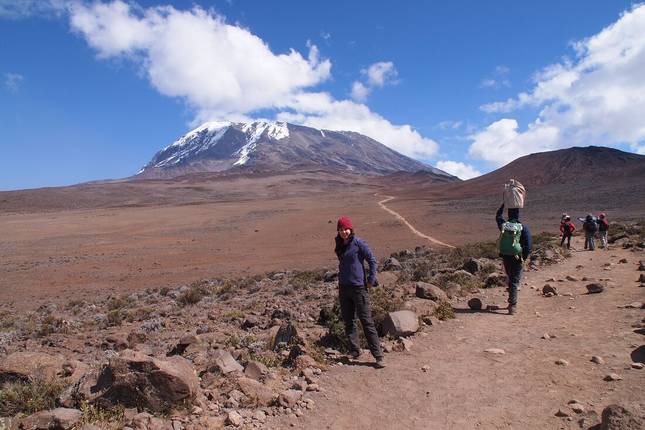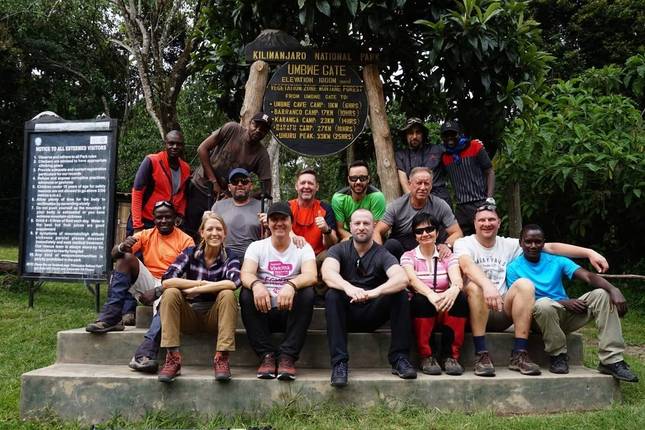
Insurance, Vaccinations, Visa and Permits for Kilimanjaro
See all Kilimanjaro toursVaccinations for Tanzania
A yellow fever vaccination is required, and you must show proof of this on arrival.
Remember to collect a health card or any form of written evidence from your doctor to prove you’ve have received the vaccination.
Most importantly, make sure you consult your doctor 6 to 8 weeks before you depart.
Malaria is definitely a risk in Tanzania, however, once you travel above 2,000 meters, for example, the risk is much lower. Your health care professional will be able to advise on the right type of preventative methods.
See below mandatory and suggested vaccinations for Kilimanjaro and Tanzania.
These are only indications, so please visit your doctor before you travel to be 100% sure.
| Vaccination | Recommended | Obligatory |
|---|---|---|
| Yellow fever | ✓ | ✓ |
| Hepatitis A | ✓ | ✗ |
| Tetanus | ✓ | ✗ |
| Typhoid | ✓ | ✗ |
| Rabies | ✓ | ✗ |
| Polio | ✓ | ✗ |
Permits for Mount Kilimanjaro
Hikers and trekking enthusiasts should be aware that climbing Mount Kilimanjaro can only be done in the company of a licensed mountain operator while taking one of the predetermined routes on the mountain.
Unlike other hikes such as the Classic Inca Trail in Peru where only a limited number of permits are allocated per season, Mount Kilimanjaro does not abide by the same permit structure.
There are limits to the number of tours or groups that can access the mountain or certain routes at a particular time, but this is managed directly by the tour operators or licensed guides.
Small tours are often carried out with groups of 10-15 or so, and they are accompanied by a local support team that includes porters, chefs and of course, the hiking guide.
Restrictions to climb Kilimanjaro:
- The minimum age allowed to climb Kilimanjaro is 10 years old.
- There is no upper age limit on who can climb to Mount Kilimanjaro’s summit, as many people in their 70's and 80's regularly take up the challenge and are successful in their accent.
- Before you travel, it is advised that you consult a medical professional to ensure there will be no problems during your trek, particularly if you are over 60 years of age.
Tanzania visa on arrival
A Tanzania visa can't be obtained on arrival in Tanzania.
- Visas must be obtained in advance by all travellers, and almost everyone will need a visa.
- A visa costs approximately US$50 for most nationalities, and will be valid for a maximum of three months.
We recommend checking your country's travel advisories in advance of booking a trip. Discover here how to get to Kilimanjaro.
Kilimanjaro travel insurance
For almost every tour or guided trek to climb Mount Kilimanjaro, it is a compulsory requirement for travellers to obtain a comprehensive travel insurance policy which covers you for:
- All medical expenses (including repatriation)
- Any expensive items including camera gear or your phone, for example.
When you do purchase a travel insurance policy, you will need to make it clear about the type of activities you will be completed during your travels.
For example, if you are travelling only around the base of the mountain, the premiums are likely to differ from a traveller who will be reaching the summit or participating in an extreme mountaineering.
It is best to declare all types of activities to make sure you have all bases covered in case of an emergency.
Just keep in mind that if you don’t make it clear from the start with regards to your activities and intentions and end up paying the lower premium, you may find out the hard way when you make a claim that you weren’t actually ever covered at all.
Most importantly, make sure you read the fine print!
If you’re a long time credit card owner, you might even be covered for travel insurance or can upgrade your existing card for a small fee. Just make sure you read the policy wording, as some credit card travel insurance will not be accepted by tour operators if it fails to tick all the boxes.
How to climb Mount Kilimanjaro
How do I prepare for Mount Kilimanjaro?
Any physical activity you can do beforehand will help make your ascent more enjoyable. As for how hard you train, this will depend on whether you're aiming for the Uhuru Peak or embarking on a shorter journey and will be different for everyone.
Learn more.When should I climb Mount Kilimanjaro?
You can climb Mount Kilimanjaro year-round, but it may be wet and cold which means you should be equipped with the right waterproof gear. Consider climbing between January–March and June–October. Note that April, May and November are the wettest months.
Learn more.How to get to Mount Kilimanjaro?
Before you start your hiking escapade to the summit of Mount Kilimanjaro, you will need to establish how to get there, and the best mode of transport to suit your itinerary or tour. Travellers flying from the UK, the US, Australia or Canada and other parts of the world have a few options to explore. Learn more.
What should I pack and what equipment do I need?
While trekking tour operators may supply some of the gear you’ll need, there are a few non-negotiables you will need that includes waterproof gear, a headlamp, sunglasses, appropriate hiking boots, personal medication, a non-disposable water bottle and a cap or a beanie for example. Learn more.
How much does it cost to climb Mount Kilimanjaro?
The cost of climbing Kilimanjaro may vary depending on a season, the route you choose and the length of the journey. Usually, the prices start at $1,000 USD and above, however, this may vary if you need to purchase any extra equipment, accommodation or add any additional transportation.
Do I need a guide to climb?
Yes. All hikes or treks on Mount Kilimanjaro can only be completed with a licensed guide. Depending on what route you take, the assistance of porters may also be included in your tour price.
Mount Kilimanjaro Routes
- Machame Route. Distance: 62 km, average duration: 6-7 days, success rate: 75%-85%
- Marangu Route. Distance: 72 km, average duration: 5-6 days, success rate: 50%
- Lemosho Route. Distance: 70 km, average duration: 7-8 days, success rate: 65%-90%
- Rongai Route. Distance: 73 km, average duration: 6-7 days, success rate: 65%-80%
- Shira Plateau Route. Distance: 56 km, average duration: 7-8 days
- Umbwe Route. Distance: 53 km, average duration: 5-6 days, success rate: 60%-70%
- Northern Circuit Route. Distance: 98 km, average duration: 8-9 days, success rate: 95%











